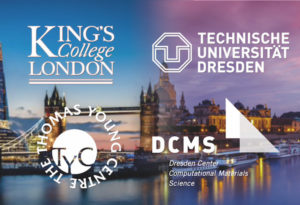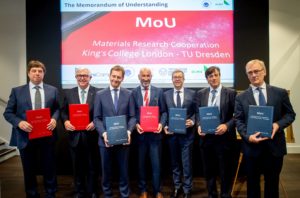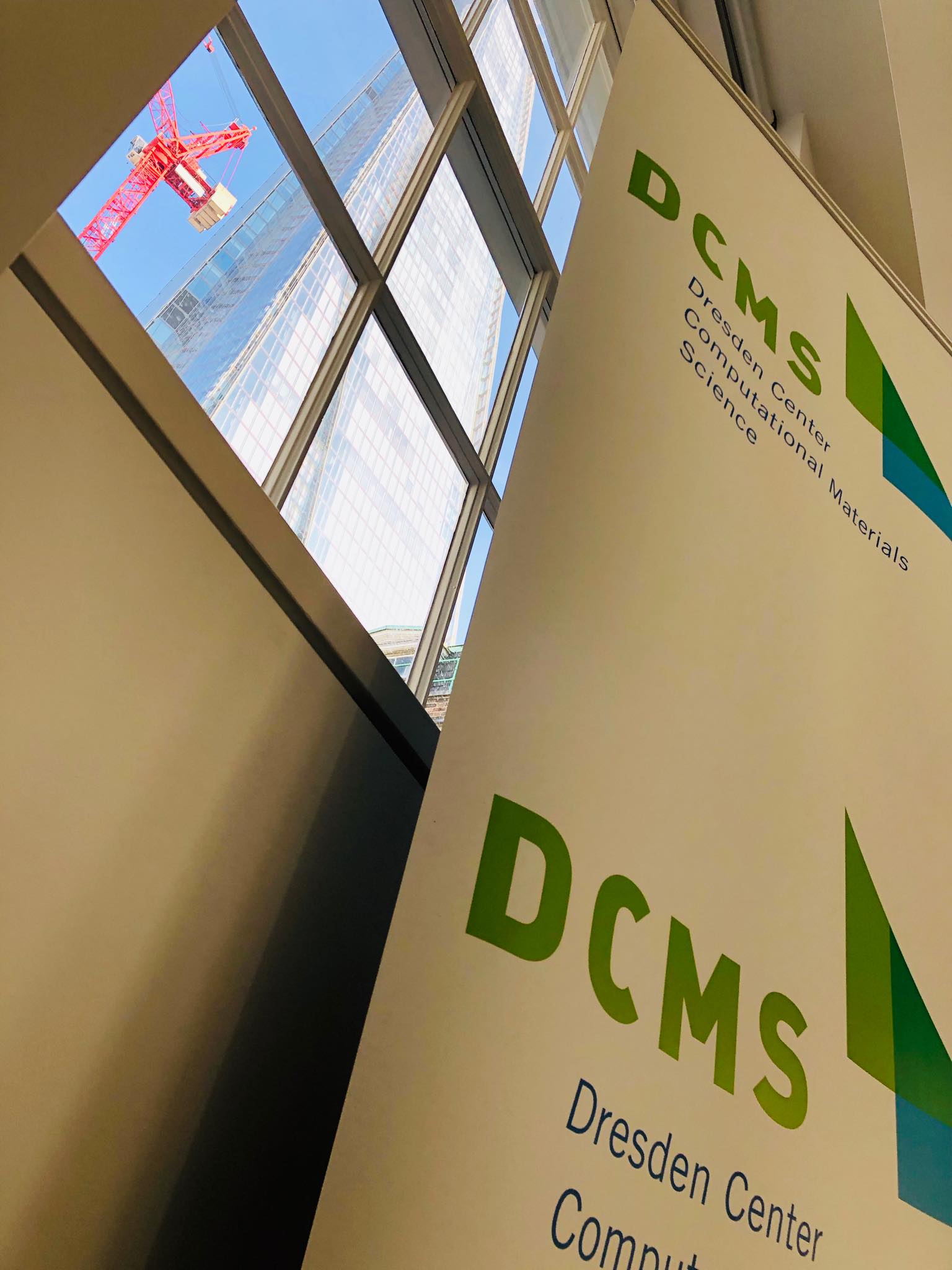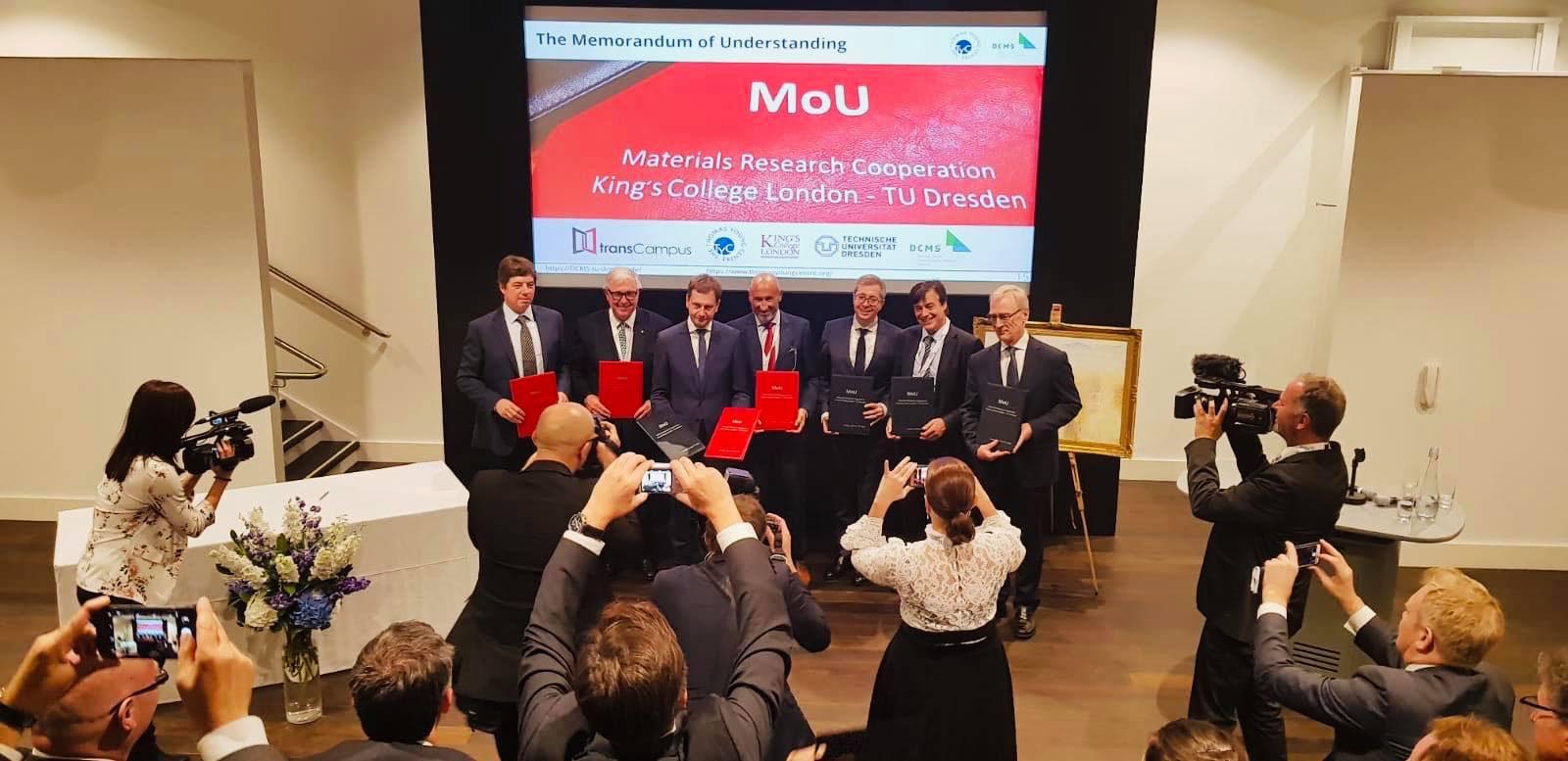 Materials researchers from both sides of the Channel intend to establish globally leading network
Materials researchers from both sides of the Channel intend to establish globally leading network
The unique transCampus London–Dresden, which transcends national borders, is growing steadily. The two top academic institutions, King’s College London (KCL) and Technische Universität Dresden (TUD), are now extending their co-operation to the field of materials research. transCampus was launched in 2015 as a research alliance with an initial focus on medicine and biotechnology. The scope of the collaboration was later broadened to include communications technology.
On 5th October 2018, KCL and TUD materials researchers signed a “Memorandum of Understanding” (MoU) as part of the delegation to London led by Saxon Prime Minister Michael Kretschmer. He will be accompanied by science and business representatives from Saxony.
Researchers from TUD’s “Dresden Center for Computational Materials Science“ (DCMS), and the London-based Thomas Young Centre (TYC) intend to establish a cutting-edge materials research cluster.
The TYC is an interdisciplinary alliance of about 100 research groups based at University College London, Imperial College London, King’s College London and Queen Mary University London.
“Dresden is a leading centre of materials research in Europe and worldwide. Strengthening the research network through international co-operations is key to our future strategy”, states Prof. Gianaurelio Cuniberti, Chair of Materials Science and Nanotechnology at TU Dresden and Managing Director of DCMS. “The expertise of Dresden and London in materials science complement each other perfectly. Both sides can hope for new impulses from the co-operation.”
Prof. Hans Müller-Steinhagen, Rector of TU Dresden, underlines the value of the MoU: “The close collaboration between Dresden and London is a success story and a blueprint for an active dialogue at the scientific and student level. This synergy not only doubles our competences but rather it enables radically new research projects and increases the visibility of both locations.“
“In times of rising nationalism and division, transCampus is a unique and trailblazing model for a close, bilateral partnership, which allows us to operate as one united campus on the highest international level“, says Prof. Antonio Hurtado, Vice-Rector for University Development at TU Dresden.
 “By signing the MoU, we have taken a further step towards a true university-wide partnership“, highlights Prof. Stefan R. Bornstein, the initiator and founding Dean of transCampus. He is the director of the medical clinic and Polyclinic III and the Centre for Internal Medicine at the University Hospital Carl Gustav Carus, as well as Vice-Dean for Internationalisation and Development of TU Dresden’s Faculty of Medicine.
“By signing the MoU, we have taken a further step towards a true university-wide partnership“, highlights Prof. Stefan R. Bornstein, the initiator and founding Dean of transCampus. He is the director of the medical clinic and Polyclinic III and the Centre for Internal Medicine at the University Hospital Carl Gustav Carus, as well as Vice-Dean for Internationalisation and Development of TU Dresden’s Faculty of Medicine.
Co-operations between medicine and biotechnology exemplify the effects and traction that such an alliance can generate. In islet cell, kidney and bone marrow transplants, the transCampus has become one of the largest transplantation centres in the world. Eight jointly appointed professorships with unrestricted access to the facilities and research findings of both locations, as well as approved funding amounting to over 50 million euro, have enabled researchers to pool their strengths. Children with incurable illnesses in Saxony, for example, are benefiting from new gene therapies developed in London.
Strengthening our research network through international cooperation is key to our future strategy. The Materials Research partnership within the transCampus combines the strength, the complementary portfolio and the infrastructures of two excellent research locations.
Gianaurelio Cuniberti, Speaker of DCMS
Furthermore, the only international graduate school in former East Germany was founded as part of the transCampus initiative. PhD students are able to complete parts of their education in highly innovative environments in both cities without having to pay tuition fees. In addition, in-depth exchanges between students take place that can be continued even without Erasmus funding.
Materials science is set to also profit from these close ties and to establish sustainable and synergetic links in research and teaching.
“We were all shocked and deeply saddened when we learned of the untimely passing of Prof. Alessandro De Vita, following a horrific road accident on Tuesday, 2nd October. He was one of our most prominent pioneers of this cooperation. Sandro was a very sharp thinker with impressive versatile mind and great sense of humour. An outstanding scientist and warm-hearted person. Generous and always ready to help. His memory and his scientific legacy will help us strengthen the tie between TUD and KCL”, states Prof. Cuniberti.
Memorandum of Understanding: https://tu-dresden.de/tu-dresden/newsportal/ressourcen/dateien/downloads/181002_MoU_DCMS_TYC_ENG-1.pdf/at_download/file






